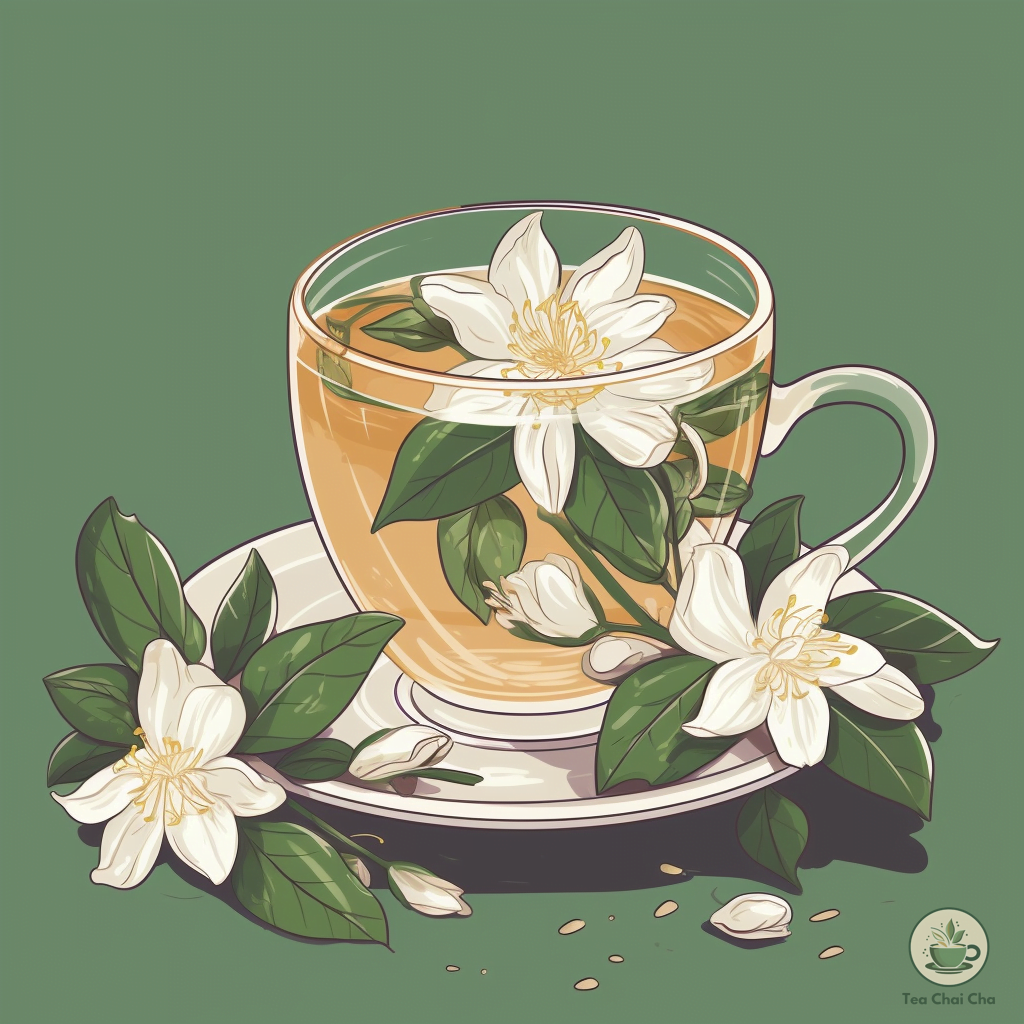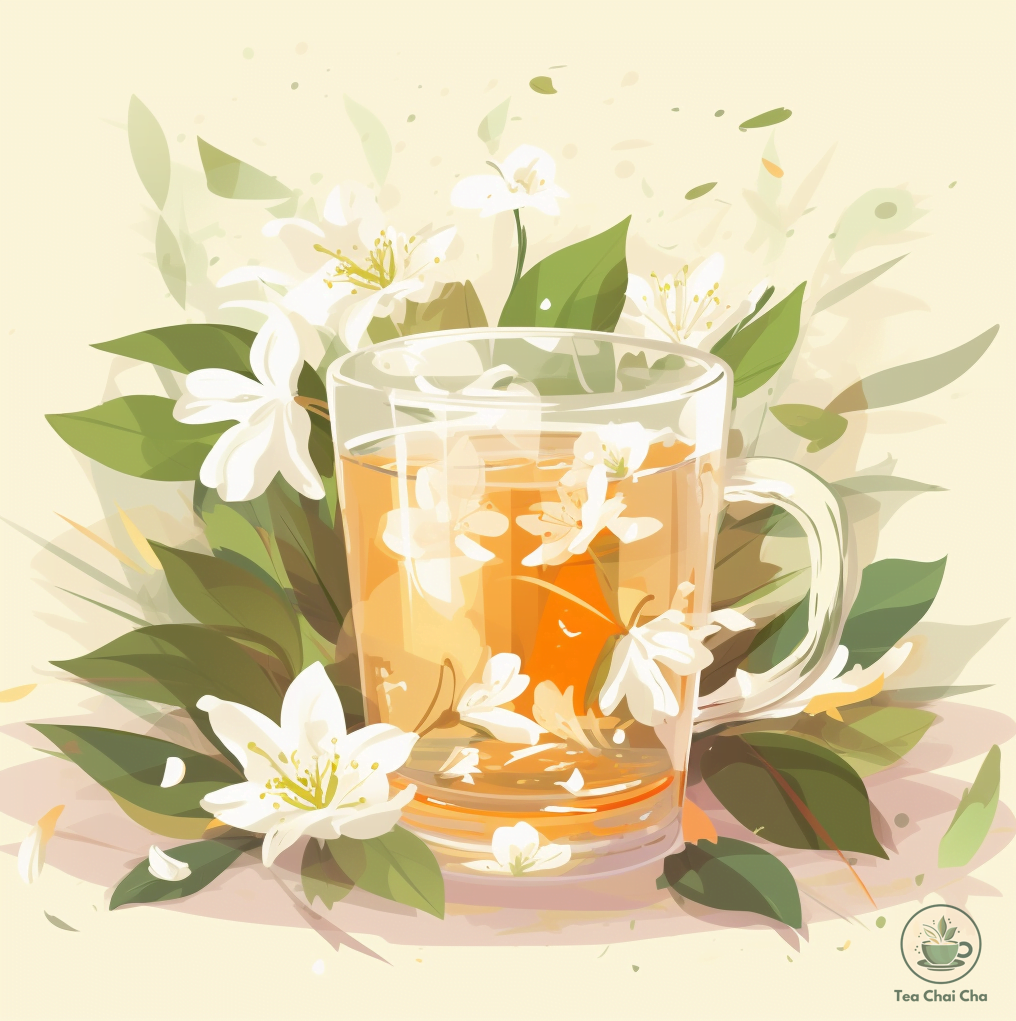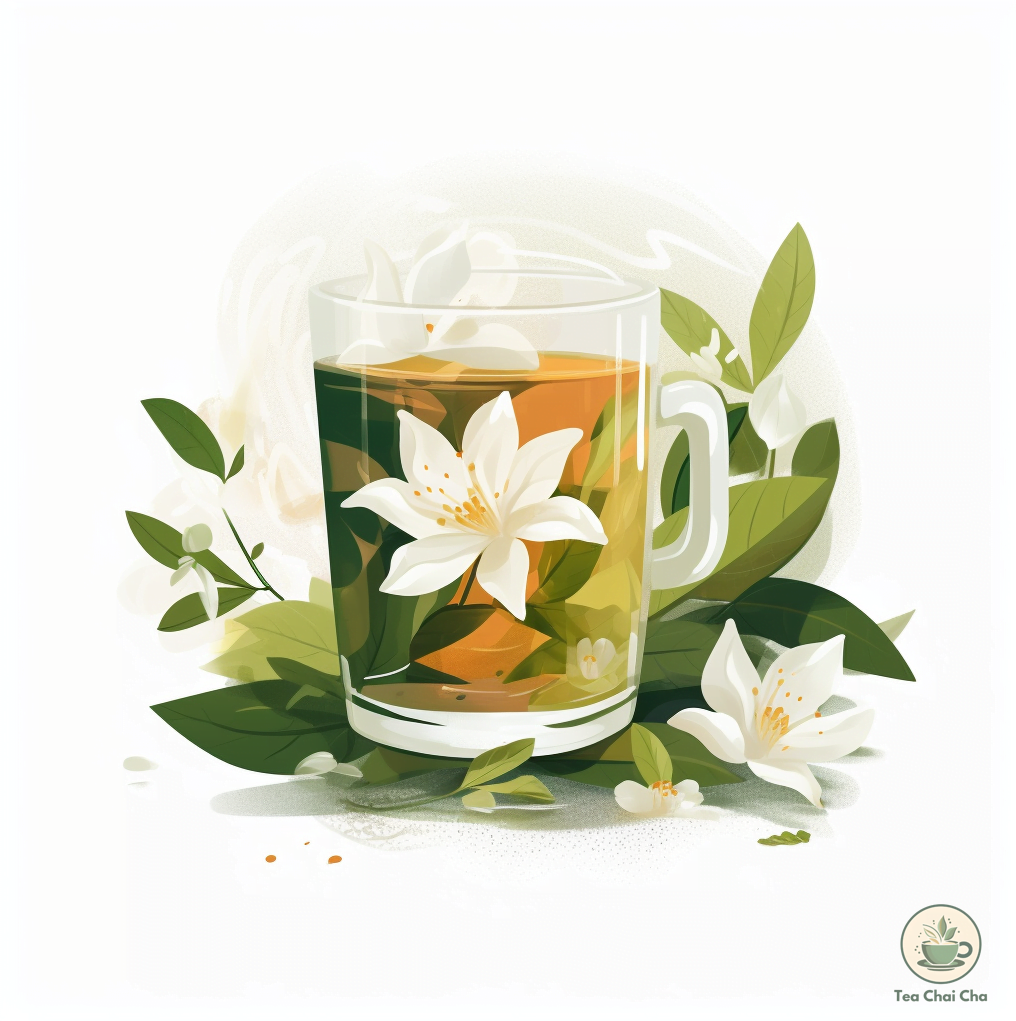Do you wonder if that fragrant cup of jasmine tea you enjoy so much contains caffeine?
You are not alone!
Jasmine tea is like a fine piece of art, known for its elegance and fragrance.
It’s a versatile tea that can cozy up with various tea types.
From delicate white tea to bold black tea, it’s a true charmer.
But the thing to know is if this tea really has caffeine and if yes, how much caffeine is in jasmine tea?
Yes, jasmine green tea has caffeine! But jasmine tea contains no caffeine and it’s caffeine-free!
Confused?
Lemme help you with its true caffeine content!
What Is Jasmine Tea?
Jasmine tea is a special kind of tea from China, known as 茉莉花茶 (mòlìhuā chá) or 香片 (xiāng piàn) in Chinese.
What makes it unique is that it’s infused with the lovely scent of jasmine blossoms.
These blossoms come from two main types of jasmine plants:
- Common jasmine (Jasminum officinale)
- Sampaguita (Jasminum sambac).
The magic happens when these blossoms are mixed with tea leaves, infusing their delightful aroma.
One of the most popular forms of jasmine tea is the “jasmine pearl.”
Imagine small, pea-sized tea bundles created by skillfully rolling fresh young tea leaves around a single bud.
While green tea is the most common base for this tea, they also use white and black teas.
The result?
A jasmine tea that’s delicately sweet and incredibly aromatic, which is why it’s one of the most famous scented teas in China.
Origin
Jasmine tea is all about the jasmine plant, which grows in high places like mountains.
This tea has deep roots in Chinese history, tracing back over a thousand years to the Ming dynasty.
But it wasn’t until the 19th century that the world truly embraced this soothing sensory experience.
The province of Fujian in China is particularly famous for producing top-notch jasmine tea.
But don’t forget, other provinces like Hunan, Jiangsu, Jiangxi, Guangdong, Guangxi, and Zhejiang also produce this scented tea.

How Much Caffeine in Jasmine Tea?
In case you are thinking “does jasmine tea have caffeine?“, NO, it does not!
Pure jasmine tea, often referred to as a tisane because it’s not technically a true tea, is a caffeine-free tea.
How’s it made, you ask?
It all starts with those lovely jasmine blossoms.
These fragrant flowers are carefully blended with hot water, allowing their sweet aroma to infuse the liquid.
The best part? No caffeine to worry about here.
But this is not true for the blended jasmine teas like jasmine green tea, jasmine black tea, etc.
So, expect 20-60 mg caffeine per cup of blended jasmine teas.
Does Jasmine Green Tea Have Caffeine?
YES, jasmine green tea have caffeine.
When it comes to jasmine tea, it’s a bit of a mixed bag.
I’ve sipped on pure jasmine tea before, the kind that’s made solely from those beautiful jasmine blossoms, and it’s an absolute caffeine-free delight.
It’s because pure jasmine tea is made from jasmine buds and flowers.
And that makes it a tisane or herbal tea, not a true tea (which always have caffeine.)
But when you blend jasmine tea with other true teas, like green tea, caffeine enters the picture.
I’ve tried jasmine green tea as well, and it’s got a bit of pep to it.
On average, jasmine green tea has around 25 milligrams of caffeine per cup.
So, the desired caffeine kick really depends on what you’re in the mood for.
Sometimes, I crave that calm, caffeine-free experience with pure jasmine tea.
Other times, when I need a little pick-me-up, jasmine green tea hits the spot.
Learn How to Brew Jasmine Green Tea here!

Caffeine in Chinese Jasmine Tea
China is where jasmine tea first made its mark.
It’s a traditional favorite in China and is often made using green tea leaves.
But it can also be blended with other types of tea like white tea or black tea.
As for caffeine, Chinese jasmine tea typically contains low amount, averaging around 25-30 milligrams per cup.
The key difference here is the type of tea used as the base and the distinct flavor profiles that come with it.
Caffeine in Japanese Jasmine Tea
Japanese jasmine tea, also known as “sanpin-cha” or “jasmine-scented green tea,” is also a blend of green tea leaves and fragrant jasmine blossoms.
The tea leaves used are typically Japanese green teas like sencha or bancha.
When it comes to caffeine, Japanese jasmine tea contains a moderate amount.
On average, you can expect around 30-40 milligrams of caffeine per cup of Japanese jasmine tea.
It’s a nice balance for those who enjoy the soothing aroma of jasmine alongside the gentle pick-me-up of caffeine.
How to Reduce Caffeine in Jasmine Green Tea
Reducing caffeine in jasmine green tea is simple.
Here’s how you can do it if you don’t want a strong caffeine kick:
1. Choose a Lower Caffeine Base Tea
If you’re concerned about caffeine, opt for a green tea with lower caffeine content as the base for your jasmine tea.
Japanese green teas like Sencha and Gyokuro typically have more caffeine than Chinese green teas like Dragon Well.
2. Brew at a Lower Temperature
Caffeine is extracted more readily at higher temperatures.
So, use water that’s slightly cooler (around 160-180°F or 71-82°C) instead of boiling water to steep your tea.
This can help reduce the caffeine content.
Use Less Tea Leaves
Decrease the amount of tea leaves you use per cup.
Using 1-2 grams instead of the usual 2-3 grams can make a difference.
3. Shorter Steeping Time
Keep an eye on your steeping time.
The longer you steep, the more caffeine is released into your cup.
Try steeping for 2-3 minutes rather than the usual 3-5 minutes for green tea.
4. Blending with Pure Jasmine Tea
If you enjoy the floral aroma of jasmine but want less caffeine, consider blending your jasmine green tea with pure jasmine tea (tisane) to dilute the caffeine content.
This way, you can still enjoy the flavor without as much caffeine.
5. Opt for Decaffeinated Green Tea
For the lowest caffeine content, you can choose decaffeinated green tea as the base for your jasmine tea.
Just ensure it’s still good quality and has a pleasant taste when combined with jasmine.
7 Factors Affecting Caffeine Content in Jasmine Green Tea
Caffeine content in a brew is never a definite number.
It can change depending on many factors like how you brew it, steeping temperature and time, etc.
Note that caffeine in your tea can vary every time you brew your tea.
So be ready for that as well..
1. Tea Base Type
The type of tea used as the base for jasmine tea plays a significant role in its caffeine content.
While pure jasmine tea, made solely from jasmine blossoms, is caffeine-free, most jasmine teas are blended with other true teas, like green tea, white tea, or black tea.
The choice of tea base will determine how much caffeine ends up in your cup.
2. Tea Blending Ratio
The proportion of jasmine blossoms to tea leaves in the blend matters.
The more jasmine blossoms used, the lower the caffeine content, as the blossoms themselves are caffeine-free.
Conversely, a higher ratio of tea leaves will result in more caffeine in the final brew.
3. Brewing Time and Temperature
How long you steep your jasmine tea and at what temperature can affect caffeine extraction.
Longer steeping times and higher temperatures can lead to more caffeine being released into the tea.
4. Tea Leaf Grade
The grade of the tea leaves used matters.
Higher-quality tea leaves tend to have more caffeine than lower-quality ones.
So the grade of the tea leaves in the blend can impact caffeine levels.
5. Harvest Time
When the tea leaves were harvested can also make a difference.
Younger tea leaves generally contain more caffeine than older leaves.
So the timing of the harvest can influence caffeine content.
6. Processing Methods
The way the tea is processed can affect caffeine levels.
For example, the level of oxidation in black tea leaves can impact caffeine content.
7. Caffeine Tolerance
Lastly, individual caffeine sensitivity varies.
Some people may be more sensitive to caffeine than others.
Hence, the same cup of jasmine tea may have different effects on different people.

Which Jasmine Tea Has the Most Caffeine
| Type of Jasmine Tea | Caffeine Content (per cup) |
| Jasmine Black Tea | High |
| Jasmine Green Tea | Moderate |
| Jasmine Oolong Tea | Moderate |
| Jasmine White Tea | Low |
| Pure Jasmine Tea (Tisane) | Caffeine-Free |
Which Jasmine Tea Has the Least Caffeine
The jasmine tea with the least caffeine is typically pure jasmine tea, which is technically a tisane, not a true tea.
Pure jasmine tea is caffeine-free and it doesn’t contain any tea leaves from the Camellia sinensis plant, which is where caffeine is naturally found.
So, if you’re looking for a jasmine tea option without any caffeine, pure jasmine tea is the way to go.
Comparing Caffeine Levels of Different Jasmine Teas
| Brand | Caffeine Level (per 8 oz cup) |
| Traditional Jasmine | 20-30 mg |
| Jasmine Dragon Pearls | 30-40 mg |
| Jasmine Silver Needle | 25-35 mg |
| Jasmine Yin Hao | 20-30 mg |
| Jasmine Phoenix Eyes | 30-40 mg |
| Jasmine Chun Hao | 15-25 mg |
Caffeine in Jasmine Green Tea vs. Other Teas
| Tea Type | Caffeine Content (per 8 oz cup) |
| Jasmine Green Tea | 25-30 mg |
| Black Tea | 50-90 mg |
| Green Tea | 30-50 mg |
| White Tea | 15-30 mg |
| Oolong Tea | 50-75 mg |
| Herbal Tea (e.g., chamomile, peppermint) | 0 mg (caffeine-free) |
Caffeine in Jasmine Green Tea vs. Coffee
| Beverage | Average Caffeine Content (per 8 oz/240 ml) |
| Jasmine Green Tea | 25-30 milligrams |
| Coffee (Drip Brew) | 95-165 milligrams |
Jasmine Green Tea is an aromatic tea that is known for its soothing qualities.
When you have an 8-ounce (240 ml) cup of Jasmine Green Tea, it typically contains around 20 to 30 milligrams of caffeine.
This amount can vary slightly depending on how long you steep the tea and the brand you choose.
But it’s generally considered low in caffeine.
On the other hand, coffee, especially drip-brewed coffee, packs a much more substantial caffeine punch.
An 8-ounce cup of coffee can contain anywhere from 95 to 165 milligrams of caffeine.
That’s significantly more caffeine than you’d find in a cup of Jasmine Green Tea.
So, if you’re looking for a beverage with less caffeine to help you stay calm and focused, Jasmine Green Tea is a better choice compared to coffee.
Does Jasmine Green Tea Affect Your Sleep?
The caffeine content in Jasmine Green Tea is relatively low, typically ranging from 20 to 30 milligrams per 8-ounce cup.
This amount of caffeine is unlikely to cause sleep disturbances for most people when consumed earlier in the day.
However, if you are particularly sensitive to caffeine or if you consume a significant amount of it in the evening, it may interfere with your ability to fall asleep or stay asleep.
To enjoy Jasmine Green Tea without negatively impacting your sleep, consider these tips:
-> Timing
It’s best to consume Jasmine Green Tea earlier in the day, preferably in the morning or afternoon, to allow your body enough time to metabolize the caffeine before bedtime.
-> Decaffeinated Option
If you enjoy the taste of Jasmine Green Tea but want to avoid caffeine entirely, you can opt for decaffeinated versions.
These ones have significantly less caffeine or are caffeine-free.
-> Moderation
Be mindful of the quantity you consume.
If you’re sensitive to caffeine, limit your intake and avoid drinking large amounts of Jasmine Green Tea in the evening.
-> Listen to Your Body
Pay attention to how your body responds to caffeine.
If you notice that even a small amount of caffeine affects your sleep, it’s best to avoid it in the hours leading up to bedtime.
Does Jasmine Green Tea Cause Dehydration?
Jasmine Green Tea does contain caffeine.
But it typically doesn’t cause significant dehydration when consumed in moderation.
Caffeine is a mild diuretic, which means it can increase urine production in the body.
This might make you think that it causes dehydration.
However, the diuretic effect of the caffeine in a cup of Jasmine Green Tea is generally not strong enough to lead to dehydration.
It’s especially true if you drink it in reasonable amounts.
Caffeine in Other Green Teas
Frequently Asked Questions (FAQs)
Does jasmine tea have high caffeine?
No, Jasmine Tea generally has low to moderate caffeine content.
How much caffeine is in a cup of jasmine tea?
A cup of Jasmine Tea typically contains about 20 to 30 milligrams of caffeine.
Does red jasmine tea have caffeine?
Yes, Red Jasmine Tea usually contains caffeine, though generally not as much as black tea or coffee. It has pretty low caffeine content.
Does Blue jasmine tea have caffeine?
Blue Jasmine Tea also contains caffeine, but like green jasmine tea, it’s relatively low in caffeine.
Does jasmine tea have low-caffeine?
Yes, Jasmine Tea is considered low in caffeine compared to many other beverages.
How much caffeine is in 500ml of jasmine tea?
Approximately 50 to 75 milligrams of caffeine would be in 500ml of Jasmine Tea, depending on factors like brewing time and tea brand.
How much caffeine is in a bag of jasmine tea?
The caffeine content in a bag of Jasmine Tea can vary but is typically in the range of 20 to 50 milligrams per bag.
It depends on the tea bag size, tea blend ratio and other factors I’ve talked about earlier.
